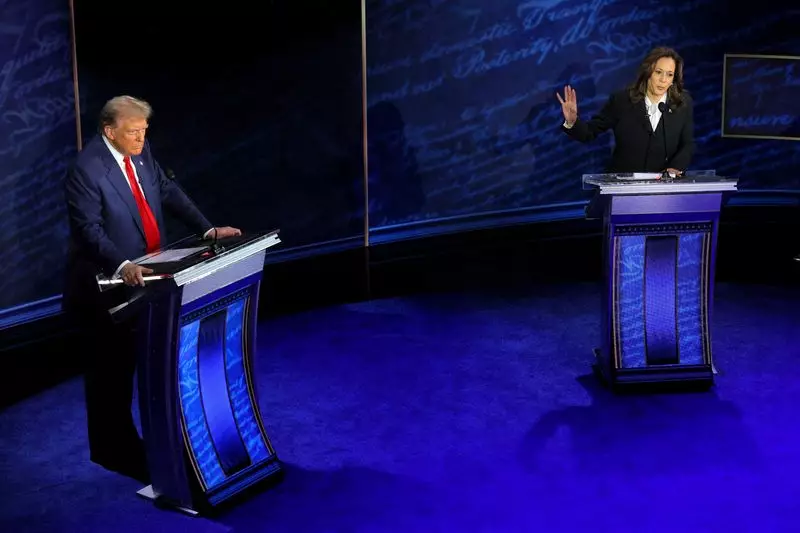In the realm of corporate finance, decision-making is inherently intertwined with external variables that can create ripples of uncertainty. Now, more than ever, with the stakes high amidst a looming U.S. presidential election, companies are reevaluating their investment strategies. A recent survey sheds light on the extent to which this electoral uncertainty may be influencing corporate financial officers (CFOs) and their confidence in the economic landscape.
The apprehension surrounding the November 5 elections has provoked a cautious stance among virtually one-third of CFOs. According to a joint survey conducted by the Atlanta and Richmond Federal Reserve Banks alongside Duke University’s Fuqua School of Business, a notable 21% of surveyed CFOs reported postponing investments primarily due to “uncertainty related to the upcoming U.S. Presidential and Congressional elections.” Additionally, over 15% chose to scale back their investment plans, amplifying concerns that political unpredictability could hinder economic growth in the short term. As businesses grapple with the potential ramifications of this electoral cycle, a significant slice of the corporate world appears to be hitting the brakes.
Despite an overarching sentiment of optimism among CFOs—69% expressed bullish sentiments regarding their businesses—this dichotomy reveals a complex interplay between macroeconomic factors and personal business assessments. It highlights how volatility can segment the corporate landscape into cautious actors and confident players, underscoring a paradox where some remain hopeful while others recoil from risks associated with external events.
Interestingly, those firms most susceptible to election-induced anxiety tend to exhibit a more pessimistic outlook on industry trends. These companies are not only less inclined to invest in expanding capacities but are also steering their funds towards cost reduction through specific asset purchases. Rather than positioning themselves for growth, these businesses focus on optimizing existing resources, which reflects an acute response to predicted uncertainties.
The survey’s authors, Brent Meyer and Daniel Weitz, noted that these cautious firms do not anticipate a rebound in growth to offset any stagnation in 2025—pointing to a critical period ahead that shapes not just individual companies but the broader economic fabric. When investment is sidelined, the implications resonate beyond the balance sheets of these companies; it threatens to influence job creation, innovation, and overall economic dynamism.
Despite the plotting dark clouds of political upheaval, the survey also reveals a prevailing optimism among CFOs regarding the state of the U.S. economy, with a significant percentage maintaining a favorable outlook. The contradiction is palpable—while the political environment looms large, it does not wholly overshadow economic confidence. The survey’s results indicate that 60% of CFOs retain a positive view of the national economy, maintaining hope amid political tumult.
Nonetheless, it is pertinent to examine the reasons driving this optimism. A majority of respondents cited regulatory and monetary policies as critical issues affecting their outlooks. With almost 60% pointing out regulatory policy as a significant concern, it becomes evident that the repercussions of elected officials’ decisions stretch well beyond electoral campaigns, manifesting in real-world corporate strategies and financial risk assessments.
Interestingly, inflation—a preeminent concern in earlier quarters—has witnessed a diminishing emphasis among CFOs, cited by only 8% as the foremost issue. As the Federal Reserve has pivoted to a stance of rate cuts amidst declining inflation, the interpretation of these fluctuations indicates a shift in what companies prioritize and how they adapt their strategies to fit emerging economic indicators.
This scenario prompts a reevaluation of how corporate leaders navigate their environments, suggesting an ongoing need to adapt to political and economic shifts. The looming elections not only serve as a backdrop for immediate financial decision-making but foster a complex landscape where cautious investment can shape future economic trajectories.
As the countdown to the elections continues, the surveyed CFOs exhibit a blend of caution and optimism, reflecting a broader narrative of uncertainty and realism in corporate finance. Ultimately, the decisions made in the coming months will not only shape the fortunes of individual firms but will ripple through the economy at large, demonstrating the intricate connection between political events and corporate investment strategies.

